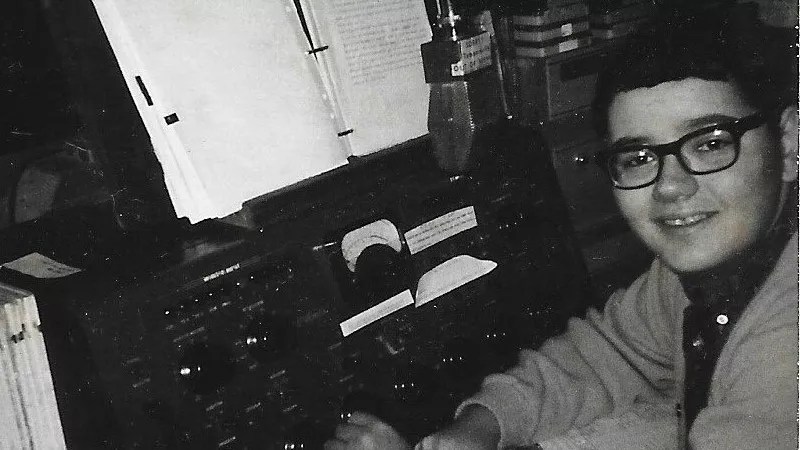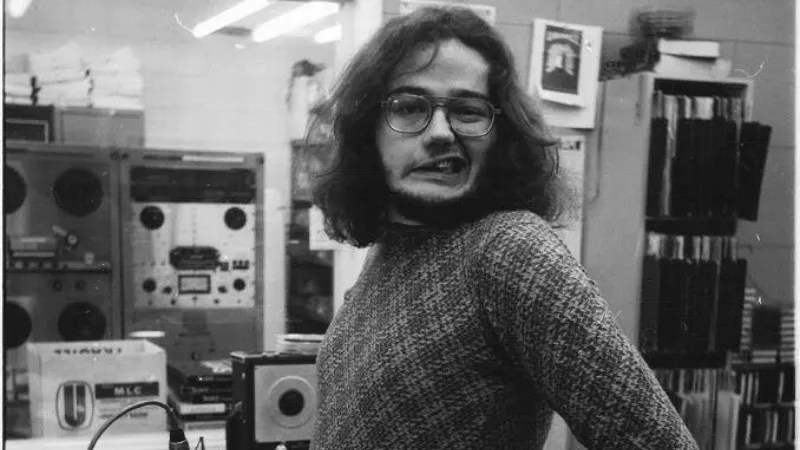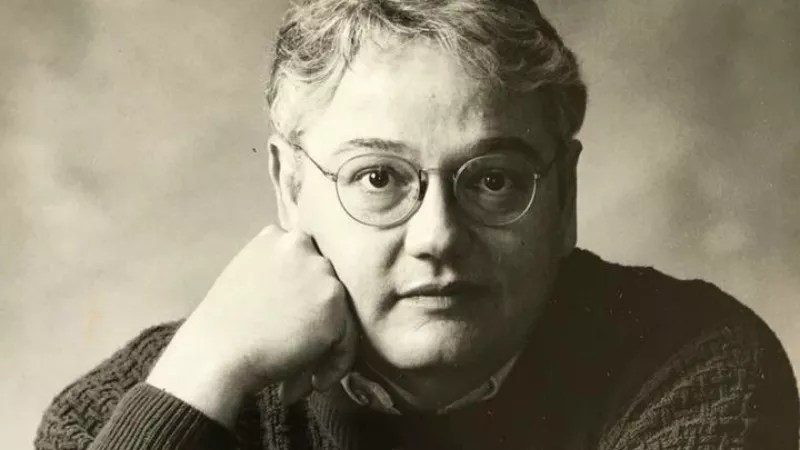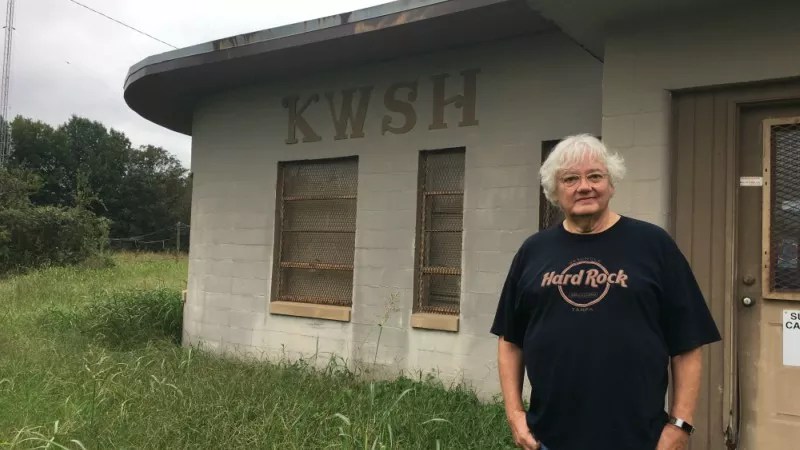
Courtesy of Mike Flanagan

Audio By Carbonatix
On October 31, seven years to the day after the launch of OpenAir, the indie-rocking affiliate of Colorado Public Radio, program director and afternoon host Mike Flanagan is leaving the station.
But while Flanagan’s departure from the outlet, which can be heard at 102.3 FM, is being framed as a retirement after decades of broadcasting, he doesn’t preclude the possibility that he’ll find himself behind a microphone again.
“It’s an age-appropriate time” to split, Flanagan says. “But you never know what’s going to happen next.”
Experience has taught Flanagan not to be surprised by the twists of fate. After all, his OpenAir run is actually his second stint with Colorado Public Radio; he spent most of the 1990s as part of its classical service’s staff.
“I joke that CPR is my ninth and fourteenth radio station,” he notes.

Mike Flanagan at his first radio station, KWSH in Wewoka, Oklahoma, where he worked from 1966 to 1968.
Courtesy of Mike Flanagan
He got an early start on building this list. “I went on the air in 1966, when I was sixteen years old,” he recalls about the two years or so he spent at KWSH in Wewoka, Oklahoma.
KWSH still exists, as can be seen below in a photo of Flanagan snapped during a recent visit to Wewoka.
His school-age stint with KWSH led to other radio gigs in Oklahoma, including employment at KOFM in Enid. Then, in 1974, he and his wife moved to Colorado – but at the time, “I was out of radio,” he says. “It’s interesting: It seems like I had a 52-year-long career, but I got mad at radio twice and left for seven years each time.”
Indeed, Flanagan has five published books, including The Complete Idiot’s Guide to the Old West, and has written for a number of publications, including the Denver Post, where he penned a long-running column, and Westword. “I think I was in the second issue ever,” he points out about this very publication, which was founded in 1977.
But Denver radio listeners would eventually become very familiar with Flanagan’s voice. From 1981 to 1984, he worked at KFML, a legendary station once heard on 1390 AM and 98.5 FM. And he served as a classical announcer on Colorado Public Radio for eight years, beginning in 1991.

Mike Flanagan at KOFM radio in Enid, Oklahoma, circa 1972.
Courtesy of Mike Flanagan
When asked why he separated from CPR in 1999, he says, laughing, “And things were on such a high note.” More seriously, he calls it “more of a mutual agreement-type situation. They were starting a classical public radio network, and the timing seemed right for a break.”
During six of the twelve years between his CPR exit and return, he oversaw Radio 1190, the University of Colorado Boulder campus station, and his tenure there proved instrumental to him being chosen to usher OpenAir into being.
Colorado Public Radio “had been simulcasting their news on 1340 AM,” he says of OpenAir’s original signal; it’s now one of two places (along with 104.7 FM) to hear Mile High Sports Radio. “We started talking, and one thing led to another. I came to work in July of 2011, and we put it on the air on Halloween.”
The influence of Radio 1190 was strong from the start.

Mike Flanagan worked at KFML radio in Denver from 1981 to 1984.
Courtesy of Mike Flanagan
“The students may have taught me more than I taught them,” he acknowledges. “They were handling an eclectic format with a lot of obscure artists, but not really mixing it up with anything older. So I would introduce things – tell them it was okay to drop in a Gene Vincent or Howlin’ Wolf cut every now and then – but basically, I let them run it. I wanted them to enjoy the independence they had in college radio.”
As for OpenAir, “the idea was to take the best of college radio not only at Radio 1190, but all over the country, and apply some formatics that inform the cool stuff. We play older stuff in the mix, but usually, they’re things people want to hear as opposed to what’s being burned out on normal Triple-A radio.”
Another key, he goes on, was “incorporating Colorado musicians. We wanted to make it a place that’s as natural in broadcasting for Colorado musicians as Red Rocks is on the performance angle. We wanted to include them in the format and introduce people to bands that maybe they’d never heard of. It was a nice hook for the whole thing, and that’s why we called it OpenAir. So much of the airwaves had been closed, but we wanted to open them up – and that’s what happened.”
In Flanagan’s view, “the way OpenAir evolved has been wonderful, although there’s definitely been a learning curve with listeners. When we first started, I’d have people tell me, ‘Say, I finally heard an artist I recognized!’ But now there are so many people with playlists on their phones, and they don’t want to hear anything they’ve heard of; they want to hear something new. And trying to incorporate that into radio is a challenge, but a worthy one. It’s almost like the format changes according to what music is out at the time.”

Mike Flanagan during his 1991-1999 turn with KCFR.
Courtesy of Mike Flanagan
A graphic representation of the demographics developed by OpenAir would resemble the letter “M,” Flanagan suggests.
“We have a lot of young people who are connecting with a medium they didn’t necessarily grow up with – an eighteen-to-thirty-year-old bump. Then, from ages 32 to 44, there’s kind of a valley, a dip. But then, when you get up to the late forties into the sixties, you’ve got this huge hill that kind of matches what the young hill looks like. We hear all the time from older people who say, ‘I love Sylvan Esso and Leon Bridges! I can’t believe how much I like these artists who aren’t mainstream.'”
The listenership for OpenAir remains modest.
“We get to 60,000 to 80,000 a week when we do the cumes,” says Flanagan; that term pertains to cumulative/accumulated audience, which measures the number of folks tuning in during a specified period of time. “So in a way, we’re still introducing ourselves to people.”

Mike Flanagan during a recent visit to KWSH, where his radio career began.
Courtesy of Mike Flanagan
Now, Flanagan is passing this task along. He reveals that “I’ve been thinking about doing this for a couple of years – I’m 68 now.” He finally decided to make the move after Colorado Public Radio president Max Wycisk stepped down at the end of June.
“I didn’t want to be retiring at the same time as Max,” he maintains. “This gave me a chance to stick around and meet our new CEO, Stewart Vanderwilt, who I’m crazy about. And I thought doing it on the station’s anniversary made sense.”
The hunt is on for Flanagan’s successor, but he’s not part of the selection process, and that’s fine by him.
“One nice thing about being of retirement age is that you can forget about goals,” he allows, chuckling. “I don’t have a mission statement, but I’m really intrigued by everything going on in social media, and also with podcasting. I think people are rediscovering an audio-only environment, which is something I may have been in training for over the past fifty years.”
He adds: “Some people would say, ‘This is where I want to be, and when I’m 75, I want to have the best podcast in the country.’ But I just want to see what’s out there first.”